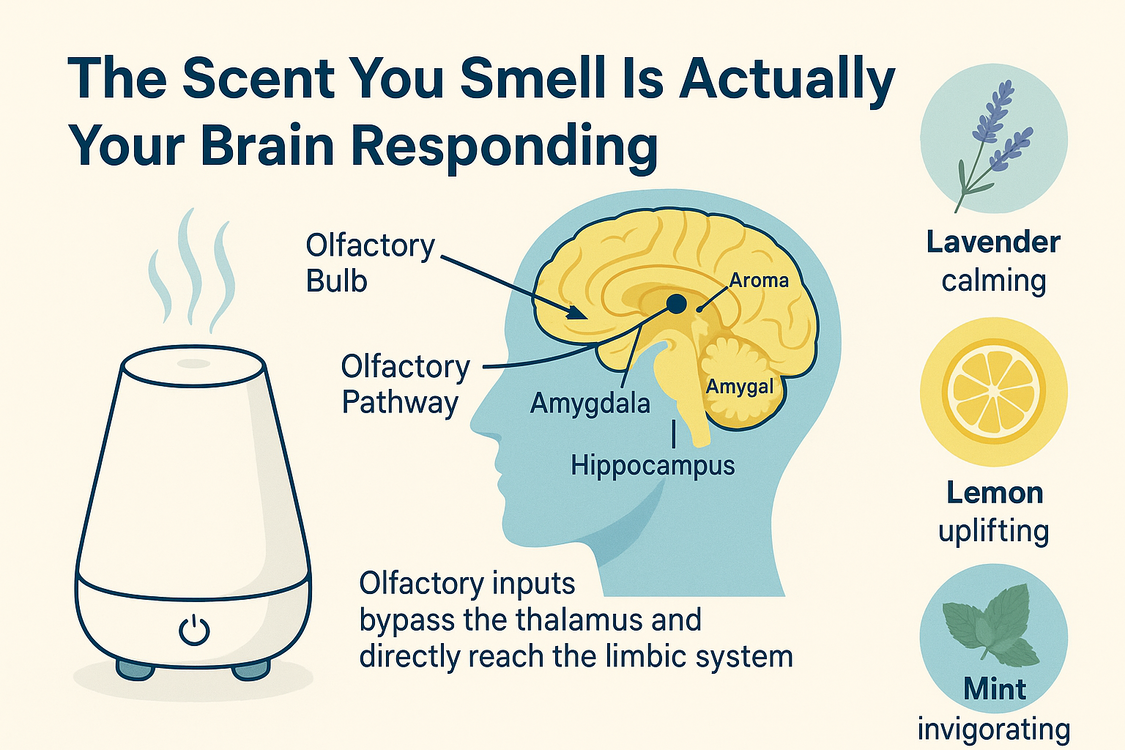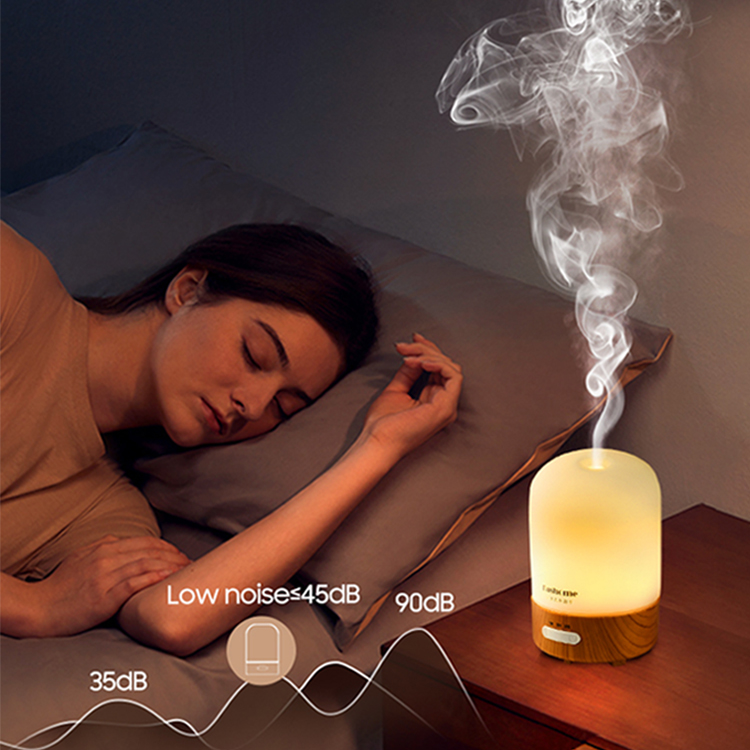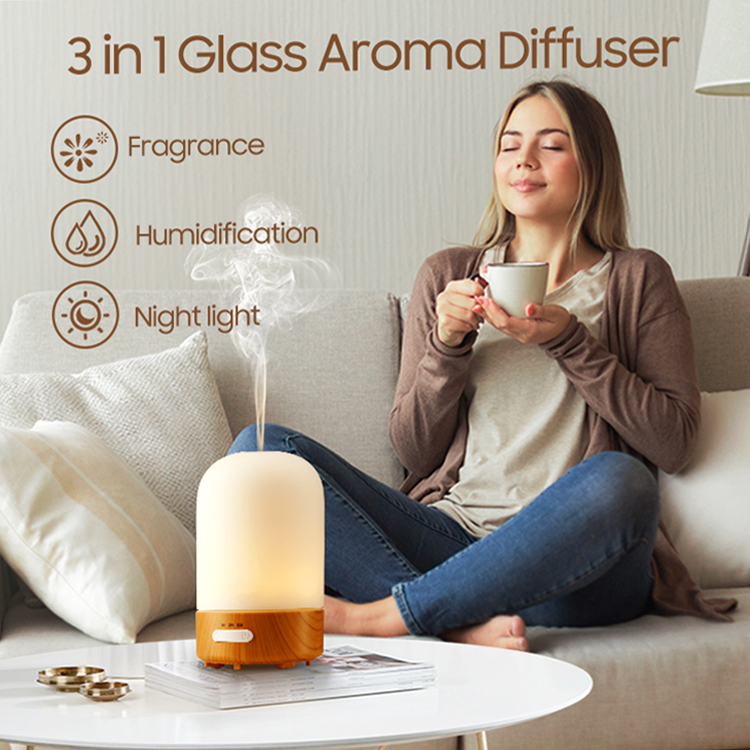The Scent You Smell Is Actually Your Brain Responding
Have you ever noticed how a familiar scent can instantly bring a sense of calm during stressful moments? This isn’t just a comforting feeling—it’s a growing area of study in neuroscience. Our sense of smell is one of the most direct channels to influence emotions and memory, and increasingly, it is becoming a tool for mental wellness.
As public awareness around mental health and life quality continues to grow, "olfactory intervention" is emerging as a powerful method of self-regulation. Meanwhile, aroma diffusers are evolving from simple home decor into subtle yet effective tools for emotional balance.
Smell: The Only Sense That Directly Connects to the Emotional Brain
Among the five senses, smell holds a unique status. Unlike vision or hearing, olfactory signals bypass the brain's relay center—the thalamus—and head straight to the limbic system, the region responsible for emotions, memory, and behavioral responses.
When scent molecules enter the nasal cavity and bind to olfactory receptors, these signals are transmitted directly to the amygdala and hippocampus. The amygdala processes emotional reactions, while the hippocampus stores memories associated with these smells. This explains why certain scents can instantly evoke vivid memories or deep emotional responses.
Scientific studies have shown that the neural connection between smell and memory is significantly stronger than with any other sense. That’s why scents are now being used not only for relaxation but also for psychological support and cognitive modulation.

Scent Is Not Just "Pleasant"—It's Powerful: How Different Aromas Affect Mood
Scents do more than smell good—they actively influence mental and physical states. For example:
Lavender and chamomile: Known for their calming effects, these are frequently used to ease anxiety and promote sleep.
Citrus scents like lemon and orange: Stimulate brain activity and are ideal for boosting focus and energy—perfect for mornings or workspaces.
Peppermint and eucalyptus: Help clear airways and improve concentration.
Sandalwood, cedarwood, and vetiver: Known for deep calming properties and often used in meditation or stress relief sessions.
A study from the University of Pennsylvania showed that subjects exposed to lavender scent during simulated anxiety scenarios had a 22% drop in cortisol levels and reported significantly lower anxiety scores.
Aroma in Everyday Life: From Bedrooms to Boardrooms
In fast-paced urban environments, scent is becoming an increasingly integrated part of daily living. Here are a few typical examples:
1. Home Settings:
Diffusers in bedrooms help establish a restful sleep cycle by releasing relaxing aromas on a timer. Citrus scents in living rooms or home offices uplift mood and enhance productivity.
2. Work Environments:
Global companies are introducing smart scent systems in meeting rooms and work areas—diffusing mild rosemary or mint to reduce fatigue and sharpen focus.
3. Commercial & Wellness Spaces:
From spas and yoga studios to therapy centers, scent is now a central element in designing "emotional spaces." It’s also becoming a key part of brand experience.
4. Therapeutic Use:
Hospitals and elder care centers are experimenting with low-dose aromatherapy to ease anxiety in older adults and create a calming environment for recovery.

The Future of Scent Tech: Emotion-Sensitive and AI-Powered Diffusers
Scent technology is moving beyond aesthetics. With advances in neuroscience and AI, the future of aroma lies in intelligent systems that align with emotional needs.
Key trends include:
Emotion-Based Scent Selection: AI-powered diffusers that learn user preferences and emotional cues to recommend personalized scent combinations.
Multi-Sensory Integration: Devices that combine ambient lighting, sound, and scent to create immersive spaces for emotional restoration.
A recent pilot study at Osaka University found that after 7 days of using smart aroma devices, participants showed measurable improvements in attention tests and reported shorter sleep latency.
Introducing Sunled Aroma Diffuser: Your Personal Emotional Wellness Companion
At Sunled, we focus on aligning scent technology with emotional well-being. Our latest intelligent aroma diffuser is designed specifically for effective mood management and daily mental balance.
Key features include:
High-Frequency Ultrasonic Diffusion: Delivers fine mist for even and rapid scent distribution
Silent Operation with Auto-Off: Ideal for nighttime or office use, ensuring safety and peace
Mood Lighting Integration: Soft ambient light enhances the sensory atmosphere
One-Touch Scent Modes: Custom-tailored for different times of the day—wake up, focus, meditate, or sleep
Customizable Aesthetic: Choose from Nordic, Japanese, or minimalist designs to match your personal space
At Sunled, we don’t just offer scent devices—we aim to build a "home of emotional intelligence," helping people regain balance in a chaotic world.

A Scent Is a Way to Care for Yourself
Scent is invisible and intangible, yet it profoundly influences our emotions and actions.
It’s more than just a fragrance—it’s a quiet act of self-care. When life feels overwhelming, perhaps the simplest way to reset is to start with your environment. Changing the scent around you might just be your first step toward slowing down, calming your mind, and living with intention.